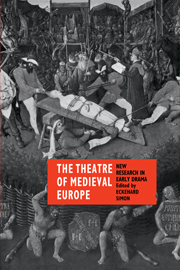Book contents
- Frontmatter
- Contents
- List of contributors
- Preface
- Note on the bibliography and system of references
- List of abbreviations for journals and series
- 1 Introduction: trends in international drama research
- PART I LATIN DRAMA
- PART II ENGLISH DRAMA
- 4 Modern editions of medieval English plays
- 5 The English mystery cycles
- 6 Castles in the air: the morality plays
- 7 ‘All the world was a stage’: Records of Early English Drama
- 8 The staging of medieval English plays
- PART III CONTINENTAL DRAMA
- Bibliography
- Author index to the bibliography
- General index
8 - The staging of medieval English plays
Published online by Cambridge University Press: 29 March 2011
- Frontmatter
- Contents
- List of contributors
- Preface
- Note on the bibliography and system of references
- List of abbreviations for journals and series
- 1 Introduction: trends in international drama research
- PART I LATIN DRAMA
- PART II ENGLISH DRAMA
- 4 Modern editions of medieval English plays
- 5 The English mystery cycles
- 6 Castles in the air: the morality plays
- 7 ‘All the world was a stage’: Records of Early English Drama
- 8 The staging of medieval English plays
- PART III CONTINENTAL DRAMA
- Bibliography
- Author index to the bibliography
- General index
Summary
In 1959 appeared a radically different account of the beginnings of the English theatre from that proposed just four years before by Hardin Craig in English Religious Drama of the Middle Ages. Craig began his own review of the first volume of Glynne Wickham's Early English Stages 1300–1660 with magisterial disdain: ‘It is unfortunate for scholarship when young scholars under stress of what they think of as new conceptual plans throw out areas of accepted knowledge.’ What had Wickham thrown out? That which Craig called ‘one of the best established of all important beliefs’, the ‘abundantly documented belief’ (italics mine) in the ‘incremental growth of the religious drama from the liturgy itself and the manner of the spread of liturgical plays by imitation and casual new creation’. Once Wickham had spent the necessary two or three years learning about liturgy, Craig was sure he would grow up and acknowledge as well the certainty of this belief.
Craig was right to sense danger from this quarter. For one thing, he had been found out. When Wickham asserted that in this ‘most recent, authoritative, history of English medieval drama’ Hardin Craig had ‘given yet a further blessing, with only minor alterations and caveats, to the standard assumptions about the origins, nature and development of the Miracle Cycles that stem from the late Sir Edmund Chambers’ The Medieval Stage’, he was absolutely correct.
- Type
- Chapter
- Information
- The Theatre of Medieval EuropeNew Research in Early Drama, pp. 130 - 148Publisher: Cambridge University PressPrint publication year: 1991



